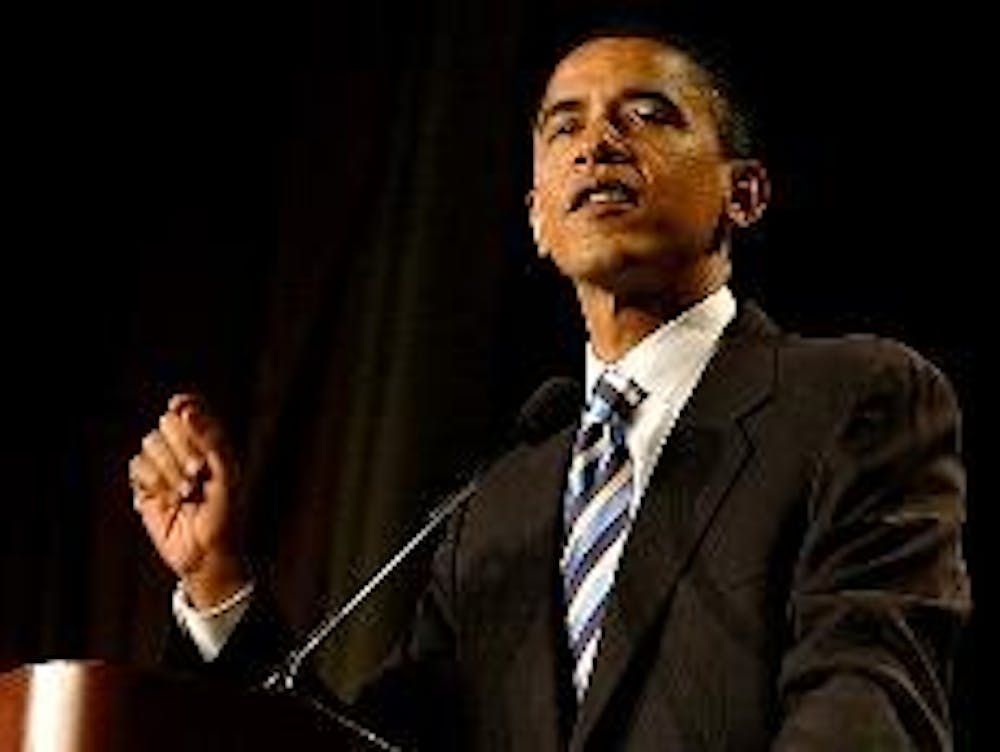Presidential hopefuls called for a serious debate on Iraq and universal health care at the Democratic National Committee's winter meeting in the packed ballroom of the Washington Hilton Friday. AU students who attended the event said they found the speeches inspiring.
Titled "Strong Leadership for America's Future," the meeting showcased speeches from Democratic presidential candidates and caucauses targeting specific groups of voters in efforts to gear up for the 2008 presidential election.
Led by DNC Chairman Howard Dean, the event featured presidential candidates Sens. Harry Reid, D-Nev., Christopher Dodd, D-Conn., Barack Obama, D-Ill., Hillary Rodham Clinton, D-N.Y., as well as former senator John Edwards, D-N.C., Gen. Wesley Clark and Rep. Dennis Kucinich, D-Ohio.
The candidates voiced enthusiasm for change on Capitol Hill, empowered by their new majority in the House of Representatives and the Senate,
"Last year, the Senate was 55/45," Reid said. "Now, it's 51/49, in our favor."
Dean later echoed Reid when he addressed the convention.
"The Democrats are back in charge again, and we'll really be back in charge in 2008," he said.
Brian Banks, a freshman in the School of International Service, said he found the meeting's atmosphere inspiring.
"You could tell everyone was excited for a new direction," he said.
The war in Iraq was emphasized in all the candidate's speeches and many expressed an urgency to bring the troops home.
Calling for a serious debate on Iraq, Obama said, "We need to put forth in unambiguous, uncertain terms how to get out of Iraq."
Miriam Callahan, a sophomore in SIS and vice president of the College Democrats, said she was impressed by Obama's speech.
"He has such a great rhythm to his speech," she said. "When he's just about to go over the top, he pulls you right back in."
Saying the president had made many mistakes in handling the war in Iraq, Clark also focused on the war because, he said, for him "it is personal."
"I'm angry because the president mistakes slogan for strategy," Clark said. "He failed to do the diplomatic work in the region that would've let our troops succeed."
When Clinton brought up the recent nonbinding resolution on Iraq, shouts of "binding" and "bring 'em home" tore through her speech.
Joining in the shouts and making peace signs with their hands were members of Code Pink, a national feminist organization opposed to the Iraq war with over 130,000 members nationwide, according to a group member.
"We'd love to support Hillary," one member of Code Pink said. "But she needs to stop funding the war. She needs to get our troops home."
Dodd voiced a message similar to that held by Code Pink.
"Spending a week voting on a nonbinding resolution is not what the American people asked for," he said.
Kucinich spoke of the need for peace elsewhere in the Middle East. Recalling his trip to Lebanon following the Israel-Lebanon war, he spoke of the schools, mosques and business he saw ravaged by the bombings. He said there were even signs in Lebanon that read, "This is your democracy America."
"We must make it a priority to work for peace in the Middle East and elsewhere," Kucinich said.
In addition to addressing the war in Iraq, many of the candidates pushed for more expansive health care.
Edwards spoke of a father begging for medical attention for his daughter in an emergency room.
"Can the democrats finally say that we stand for universal health care for every man, woman and child?" he said.
Banks said he appreciated Edwards' speech.
"He was incredible at hitting the point home," Banks said.
Other issues discussed at the meeting included climate change and poverty within America.
Clinton was the only candidate to mention the genocide in Darfur, despite the numerous representatives of the "Save Darfur" campaign in the audience.
For Jordan Boyd and Max Friedman, both freshmen in the School of Public Affairs, they said the meeting was especially vital for less publicized candidates.
"The speeches strengthened the lesser-known candidates," Boyd said.
He said, however, that it was impossible to pick a favorite candidate afterwards.
"There were a lot of excellent speeches," he said.





